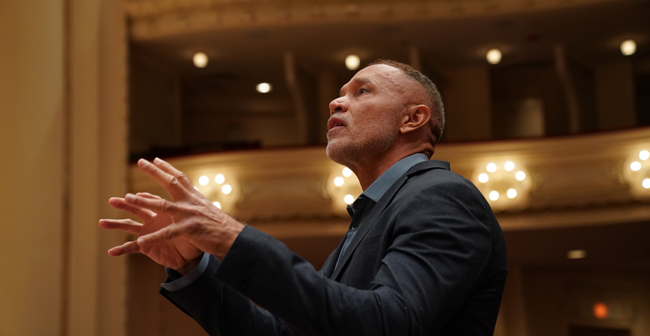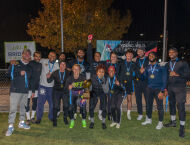Culture
 Photo: Todd Rosenberg
Photo: Todd Rosenberg
Get Out Composer Michael Abels Joins NSO For Live Score
September 1, 2018 @ 12:00am
Capturing the right sound for a movie is essential to its quality. In every film you love, there are moments heightened through musical choices made by either the director or his composer.
In 2017, there was not a more lauded movie than Get Out. The Jordan Peele brainchild racked up accolades and acclaim throughout the year, including an Academy Award for Best Original Screenplay and nominations for Best Picture, Best Actor and Best Director. The thriller-horror movie defied genres, and its subject matter tackled racial tension and societal issues.
For any movie involving elements of fear and the unknown, music is an imperative element to building tension. For Get Out, Peele enlisted orchestral composer Michael Abels – a man who had never scored a feature film – after discovering him on YouTube. Now that he’s successfully captured the sound of Peele’s vision, Abels is at work on the writer-director’s second thriller Us, set to come out in 2019.
But before moving on to the next picture, Abels is set to conduct the National Symphony Orchestra (NSO) in a live performance of the Get Out score paired with a screening of the film at the Kennedy Center on September 20. On Tap had a chance to speak with him about how Peele tracked him down, the film’s legacy and his relationship with one of Hollywood’s rising stars before he leads the orchestra through this eerie soundtrack.
On Tap: With live music from the NSO accompanying the movie, what do you think the audience should expect from this performance?
Michael Abels: I think you just asked the question of the hour. I have no idea, and I’m thrilled to find out. One of the fun parts of doing a horror movie are the jump scares. There are a couple really great ones here. If everyone has seen the film, they probably won’t be as scared, but I really want that for the live audience. At the same time, I think the audience will be people who are fans of the film, and also fans of the music.
OT: Jordan Peele said in an interview that he discovered you on YouTube. What was your initial reaction when he reached out to you?
MA: I’m a composer of concert music, live orchestras and performances, and somehow Jordan Peele saw one of them and had the Get Out producers hunt me down. I got a voicemail and I thought it was a prank. When I read the script, it was about 85 to 90 percent of the finished film, and it was amazing. He turned out to be about as great as he is in interviews – very funny and candid. He has a real understanding of people, and I admired that. I wanted him to be successful, and if he thought I could write the music to his film, I was on board.
OT: What were some of the initial requests Peele made for the sound of his vision?
MA: He saw a particular piece of mine called Urban Legends. It’s my most edgy sounding orchestral piece, and Jordan loves music that’s really out there. It goes with his love of horror and suspense. He’s a huge aficionado and fan of the genre – not in just how they’re directed, but of their music. In our first conversation, he said this music had to be scarier than shit, and it’s hard to mistake that clear direction. The second thing he mentioned was he wanted the African-American voice – both literally and figuratively – in the score. He heard this in my music and knew it was something I was comfortable doing – taking something that isn’t normally in a classical setting and putting it there and making it work. We talked about the character of the music, and it had to be clearly African American but not have the undercurrent of hope like in gospel and blues. He was looking for gospel horror that was scarier than shit.
OT: So, he wanted the music to be unsettling. How did you two collaborate and nail the sound of this movie?
MA: The film plays like a classic suspense film. Jordan had cited Rosemary’s Baby and The Stepford Wives, and each of those films have a slow burn. You know something’s not right, and it’s slowly revealed to you. The score has to measure up. The first queue I did was the hypnotism scene, and it’s an iconic one. The audience has to get hypnotized and the music has to sneak in. Part of what a score does is inform the audience in a way that’s not on the screen. It does it in the subconscious.
OT: At what point in the process did you guys settle on “Sikiliza Kwa Wahenga” as the song that opens and closes the movie?
MA: Jordan likes to hear music in preproduction. It’s more expected that music is saved toward the end, not because it’s not important, but because it’s timed to the picture. Until a film is edited together, it doesn’t really exist in time. However, Jordan considers it as part of production design. I wrote “Sikiliza Kwa Wahenga” and a few others at the beginning to see what he liked. When he chose it as the main title, I was flattered.
OT: What was your initial reaction when you first read the plot of the film, and then again when you saw the completed picture?
MA: I thought it was good, but you want to feel that way. We thought it was like nothing else. Good films die at the box office every weekend, and if we knew why, fewer films would die. Personally, I had a sense some people would love it and others would find it polarizing. I was so proud of Jordan for taking so many risks with the film and hitting the ball completely out of the park.
OT: I really wanted Get Out to win Best Picture. I know winning an Academy Award wasn’t Peele’s ultimate goal, but I think in 10 years when people talk about cinema from 2017, they’ll point to Get Out as a breakthrough picture. Do you think the film will be remembered and revered as strongly as I do?
MA: I think it’s going to be studied in film schools. It’s a movie that will stand the test of time, and someday when people watch old movies they’ll say, “Hey, let’s watch Get Out.” My original goal was to score it and have Jordan feel like I did his work proud. I wanted to not get fired. That sounds kind of facetious, but in the context of being a film composer, it’s a significant thing to hope for. I think it’s a movie that will be held up as a great example of a genre-busting film, and [especially] when you add the fact it paved the way for Black Panther, Sorry to Bother You, Blindspotting and BlacKkKlansman. Hollywood says it wants to be more diverse, and it’s flat-footed on following through, but all of this demonstrates there’s a whole creative world that hasn’t been mined at all. I hope it’s not a fad and is an actual sea change.
OT: You’re also working on his 2019 film Us. There are iconic duos of directors and composers such as Christopher Nolan and Hans Zimmer. Do you feel like you and Peele could end up like that, and does it feel like you kind of hit the lotto on your partnership with Peele?
MA: It’s so fun working for him. He never wants anything normal, and the notes that come back are like, “Take all of the normal shit out.” I can only hope [for a lasting partnership], but regardless of if that happens, my focus is one film at a time. The reason those relationships develop is because – and this is just my speculation – directors are mostly visual people, so when they’re talking with editors and cinematographers, there’s a shared language. With music, some directors aren’t as familiar with musical language, so they’re required to hand over this very important aspect of the film to someone they trust. If they find a person who’s able to realize their auditory vision, they’re really glad and they enjoy having that feeling of trust.
Watch Abels conduct the NSO on Thursday, September 20 at 8 p.m. at the NSO Pops: Get Out performance and screening in the Kennedy Center’s Concert Hall. Tickets are $29-$99. Learn more at www.kennedy-center.org.
The John F. Kennedy Center for the Performing Arts: 2700 F St. NW, DC; 202-467-4600; www.kennedy-center.org







